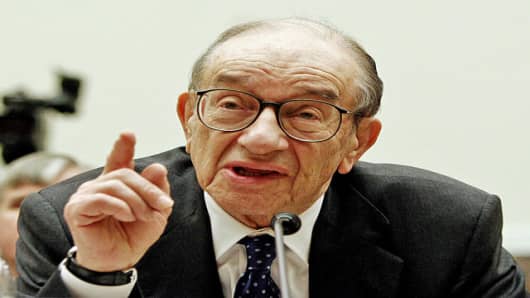The US is pursuing a policy of weakening its currency which is driving up exchange rates in the rest of the world, according to Alan Greenspan, the former chairman of the Federal Reserve.
Writing in today’s Financial Times ahead of the G20 meeting in Seoul, Mr Greenspan argues that with China also holding down the renminbi , the upward pressure on currencies elsewhere risks a return to widespread trade protectionism. Mr Greenspan criticizes China for continuing to prevent the renminbi strengthening, saying it reflects a misguided view that a weak currency is necessary for export growth and political stability. “China has become a major global economic force in recent years,” he writes. “But it has not yet chosen to take on the shared global obligations that its economic status requires.” More unexpectedly, Mr Greenspan adds: “America is also pursuing a policy of currency weakening.”
Mr Greenspan does not specify which agency in the US system is implementing policies to weaken the dollar , but his words are likely to be seized on by critics of the US Federal Reserve. Governments around the world have complained that the Fed’s recent move towards pushing more dollars into financial markets is creating destabilizing capital movements and pushing up exchange rates elsewhere. In the US system, formal responsibility for exchange rate policy lies with the US Treasury. Tim Geithner, Treasury secretary, has always maintained that the US’s policy of a strong dollar is unchanged, though the Treasury has never specified what value that implies.
Ben Bernanke, Fed chairman, recently defended his actions and said he was fully aware of the global importance of the dollar.
“The best fundamentals for the dollar will come when the economy is growing strongly,” he said.
Speaking in London, Mervyn King, the governor of the Bank of England, also expressed concern that failure to address the issue of imbalances could create the conditions for a new financial crisis.
“If we end up 12 months from now with countries taking protectionist measures, everyone will suffer. I think the absolute imperative for this weekend [at the G20] is a clear demonstration that every member of the G20 recognizes that the imbalances are a problem...If we don’t do that then I fear the next 12 months will be an even more difficult and dangerous period than the one we have been through,” said Mr King.


